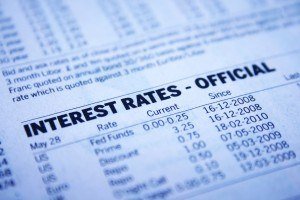
If you are one of the small business owners that keeps an eye on the external environment you may be wondering how an interest rate rise might affect your business.
Last week the governor of The Bank of England indicated that UK interest rates could rise “at the turn of this year”. He said that he expected rates to rise over the next three years, reaching “about half as high as historical averages”, or about 2%.
Clearly this is beyond anyone’s control outside of the monetary policy committee at the bank, however it could affect your business.
Many small business owners do not factor in potential changes in the external environment, concentrating only on what they are doing within their businesses. This is a little like driving a car thinking that you have total control if you don’t drive too fast, use the gears correctly and leave lots of breaking distance. Ignoring external hazards such as other drivers not taking the care you do means that even if you are involved in “an accident that isn’t your fault” it certainly has the potential to delay you or indeed stop you in your tracks.
Regular ‘environmental scanning’ can help you spot potential threats, as well as potential opportunities, before your competition. Something as simple as conducting a PESTEL analysis every quarter will give you insights into potential changes in the external environment, allowing you to make plans for altered trading conditions.
Take an interest rate rise in the UK for example. This would have a number of potential effects on the economy (the first ‘E’ in PESTEL analysis). So, how might an interest rate rise affect your business?
Firstly, let’s look at the facts.
- Increases in the base rate will probably increase interest payments on credit cards and loans. Not only does this discourage people from borrowing, bit those that already have high levels of credit card debt or other variable rate loans will have less disposable income because they have to spend more on interest payments.
- Another effect of an increase in the base rate is that interest payments on variable mortgages will increase. This will have a big impact on consumer spending. This is because a 0. 25% increase in interest rates can increase the cost of a £200,000 mortgage by £60 per month. This will also reduce many consumers disposable income.
- The over 50s have enormous spending power, however higher interest rates make it more attractive to save in a deposit account because of the interest gained. If they are saving they won’t be spending as much.
- Higher interest rates increase the value of pound. A strong Pound makes the export market less competitive – reducing exports and increasing imports.
- Rising interest rates affect both consumers and business and so it is quite possible that falls in consumption and investment may result.
- Interest rates have an effect on consumer and business confidence. A rise in interest rates discourages investment; it makes firms and consumers less willing to take out risky investments and purchases.
Of course you then need to evaluate what you have learned and how it affects your target market. For example you may be targeting young professionals. The effect of higher interest rates for instance will pave an impact on some of your market but not others.
Those with large mortgages for example (often first time buyers in the 20s and 30s) will be disproportionately affected by rising interest rates whilst those with savings may actually be better off.
Another thing to bear in mind is that other economic variables in the economy could increase or decrease the effects an interest rate rise might have. For example, if house prices continue to rise very quickly, people may feel that there is a real incentive to keep spending despite the rise in interest rates.
Continually scanning the environment may be time consuming but it’s amazing how you will spot opportunities and threats which you can either take advantage of or head off prided you evaluate what you’ve discovered in relation to your target market.
 If you are one of the small business owners that keeps an eye on the external environment you may be wondering how an interest rate rise might affect your business.
If you are one of the small business owners that keeps an eye on the external environment you may be wondering how an interest rate rise might affect your business.






